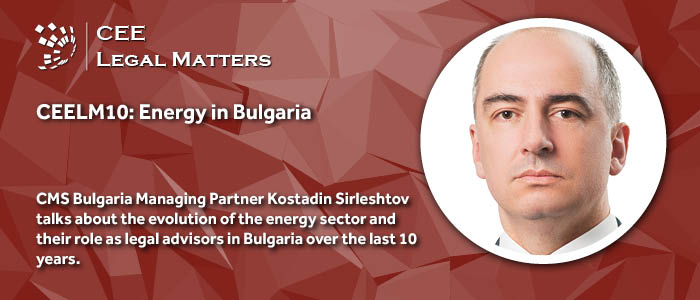CMS Bulgaria Managing Partner Kostadin Sirleshtov talks about the evolution of the energy sector and their role as legal advisors in Bulgaria over the last 10 years.
CEELM: What has kept you and your energy team the busiest over the last decade?
Sirleshtov: From 2013 to 2015, our focus was on safeguarding the interests of foreign investors in the renewables sector, particularly in the wake of retroactive legislative changes impacting feed-in tariffs. This era was marked by significant legal challenges, as over EUR 2 billion had been invested prior to 2012, only to be affected by these regulatory shifts. We engaged in extensive legal battles, including high-profile cases in the supreme and constitutional courts, where we successfully defended our clients’ interests. Later, the period of 2015-2018 saw a diversification in our workload – renewables remained a significant area, buoyed by a more stable regulatory framework and an influx of expert input. This stability fostered a conducive environment for refinancing projects and M&A activities, underpinned by feed-in tariffs. At the same time, we also delved into the upstream oil and gas sector, working with industry giants like OMV, Total, and Shell on substantial investments. Since 2018/19, the landscape has shifted toward new renewable projects, particularly those developed in merchant markets without reliance on feed-in tariffs. This phase has been characterized by a focus on project development, working closely with developers to navigate this evolving market.
CEELM: Looking back at the last 10 years, what were the most intense periods in terms of workload, and what factors do you believe led to them?
Sirleshtov: The intensity of our work has varied, with notable peaks around 2015-2016 and from 2021 onward. The earlier period was a turning point, marking the end of a challenging era where we combated widespread scepticism toward green energy. This shift was a culmination of our persistent efforts, resulting in numerous refinancing and M&A deals. The resurgence of activity from 2021 can be attributed to the recognition of renewables as the most cost-effective energy source, negating the need for state support. This period saw an influx of merchant projects, driven by a change in regulatory mindset and market dynamics. The year 2022, in particular, stood out due to external factors like the Ukraine crisis and European energy challenges, which amplified the focus on renewable energy.
CEELM: How have the profiles of energy projects evolved over the last decade?
Sirleshtov: The energy project landscape has undergone a dramatic transformation. In 2013, the market was dominated by foreign investors, with a clear demarcation between Bulgarian developers and international financiers. However, the subsequent reduction in feed-in tariffs prompted a shift, with many foreign investors exiting the market, often selling their stakes at lower prices to escape volatile market conditions. This vacuum gave rise to a new breed of Bulgarian speculative players who entered the market with the hope of tariff recovery, a gamble that proved successful for some. Between 2015 and 2018, we observed a trend of large foreign funds and investors divesting to entities with a long-term vision. The most recent period – from 2019 to 2022 – showcased an active market with a unique mix of optimism from both Bulgarian and foreign investors. However, overly enthusiastic investments by some Bulgarian entrepreneurs last year led to a recalibration of expectations, paving the way for a more balanced approach between international and local investors.
CEELM: What new expectations do you see emerging from clients, and what aspects do you think have decreased in importance over time?
Sirleshtov: The evolution of client expectations mirrors the changes in the energy sector. In the early days, our focus was predominantly on navigating the regulatory landscape, offering assurance and protection against governmental unpredictability. This period was characterized by smaller, less complex projects, where our role was more about providing a secure investment framework. In contrast, the current climate demands a deeper engagement in project development. With government influence receding, our attention has shifted toward ensuring that projects are developed in compliance with increasingly stringent legal and environmental standards. Our role has evolved from being predominantly strategic advisors to being involved in detailed legal work, emphasizing environmental considerations and local community impacts.
CEELM: What is on the horizon for the energy sector? What do you believe will be the highlights in a similar interview 10 years from now?
Sirleshtov: The next decade promises transformative changes in the energy sector. We anticipate significant developments in onshore wind energy and the emergence of innovative trends like floating photovoltaic systems, originating from Asia, and agrivoltaics – a concept gaining traction in Western Europe. Battery storage is set to become a pivotal component in managing the discrepancies between renewable energy generation and consumption patterns.
Infrastructure upgrades will be a key focus, alongside the development of new nuclear units across Central and Eastern Europe. These developments, while challenging, present an exciting landscape for the energy sector, promising a more sustainable and efficient energy future.
CMS is CEE Legal Matters' Practice Leader for Energy in Bulgaria for 2024 – learn more here.
This article was originally published in Issue 10.11 of the CEE Legal Matters Magazine. If you would like to receive a hard copy of the magazine, you can subscribe here.






















